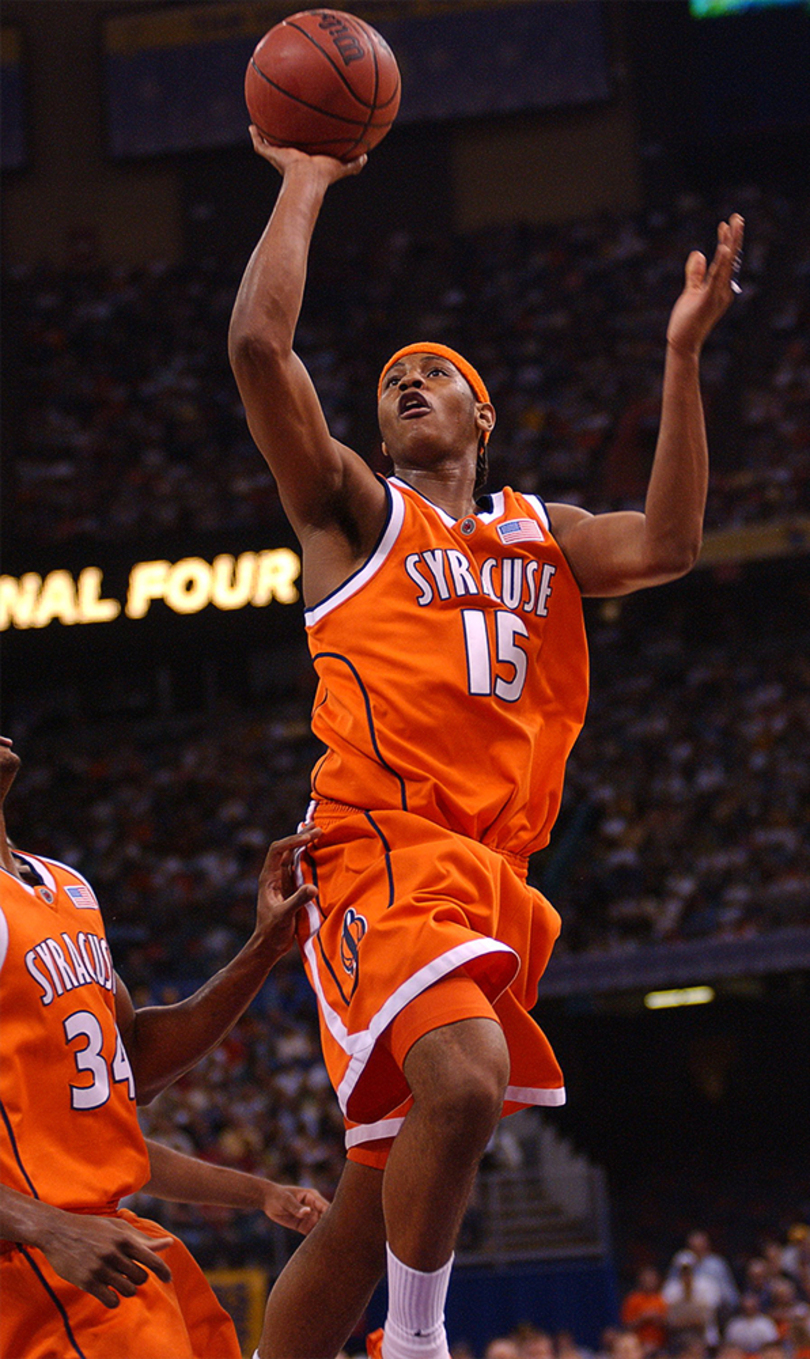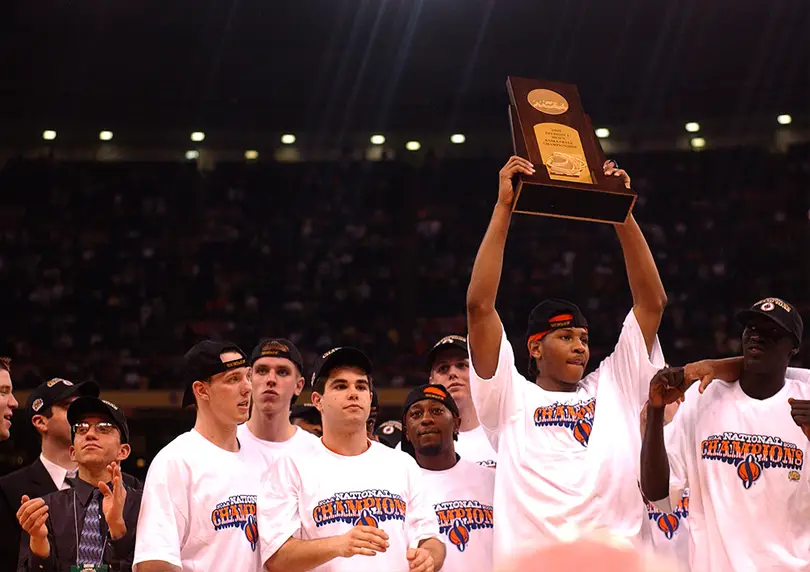Their game: Syracuse entered the 2002-03 season inexperienced, unranked but they ended it national champions
Hakim Warrick rising up to block Michael Lee’s last-ditch 3-point attempt. Jim Boeheim throwing his hands up in utter euphoria, a boyish smile on his face. Carmelo Anthony, just 18 years old, hoisting the Wooden trophy with his championship hat tilted to the side.
These are the images of a night where months of hard work came to fruition at the perfect moment. At the pinnacle of college basketball, the Syracuse Orangemen won the 2003 national championship, defeating Kansas 81-78 in the Louisiana Superdome. It was the first and only NCAA title in program history.
But winning the national championship didn’t solidify how good the team was for those inside the program ― it just reminded them.
Ten years after knocking off Kansas, members of the title run can still feel the thrill of winning it all. They won the national championship not in one night, but by developing a calm, confident and competitive identity throughout the season. Aware of the team’s young talent, veteran leadership and unprecedented camaraderie, they knew they were contenders long before the nation did.
“Everyone had fun and enjoyed being around each other,” former guard Andrew Kouwe said. “There was really no time to fight or argue; we were all enjoying the ride too much from start to finish.”
Kouwe, a junior walk-on on the 2002-03 team, was also on the team that failed to make the NCAA Tournament the year before. After going 23-13 in the 2001-02 season, six members of that team either transferred away or graduated.
Boeheim brought in the highly touted Anthony and point guard Gerry McNamara to bury the program’s woes from a season ago. Upon arriving on campus, both injected a new energy in the team.
At the first intrasquad scrimmages that August, the freshman pair turned heads. Anthony was a 6-foot-8-inch small forward who shot like a shooting guard and dribbled like a point guard. McNamara hounded his opponents defensively, showcased a sweet shooting stroke and made up for his lack of size ― 6 feet, 2 inches ― with a fierce competitive fire.
“This was before you could go onto YouTube and check out someone’s high school highlights,” Kouwe said. “I hadn’t seen Carmelo or Gerry play before they came to school, but when I finally did I was amazed.
“I went to Boeheim’s office the next day and said to him, ‘These guys are really good, Coach.’ He just sat there, shook his head and smiled. He knew he had done something good.”
Despite starting the season unranked, expectations within the program were high. Then the Orangemen lost their season opener to Memphis, 70-63, at the Coaches vs. Cancer Classic. It was the first time ever that a Boeheim-coached team lost a season opener in regulation. But the freshman standout Anthony made sure it would also be the first Boeheim-coached team to win the national championship.
In his collegiate debut, Anthony posted a double-double with 27 points and 11 rebounds, and was the only Syracuse player to play all 40 minutes. McNamara hit three straight 3s amid a 22-5 run that put Syracuse up six in the second half.
The Orange also received significant contributions from sophomores Warrick, Josh Pace and Craig Forth, but couldn’t match a more experienced Memphis squad. From the start, it was clear the team needed a veteran presence to glue its young talent together.
Enter Kueth Duany.
“You need guys that can score, but Kueth Duany is a guy that is not talked about enough,” Forth said. “When we needed a leader, he took the reigns and pushed us every day.”
Duany, a wing from Bloomington, Ind., was the lone senior on the team. Prior to the season, his teammates elected him captain and he modeled hard work and mental toughness for the team’s young core.
With Duany leading, the Orange displayed a loose confidence on the court, uncharacteristic of a rotation comprised almost entirely of underclassmen. The team shook off its loss to Memphis and won 23 of its final 26 regular-season games, finishing the regular season 23-4 with a 13-3 record in the Big East.
As the Orange gradually gained national recognition, Duany became an extension of Boeheim in the locker room. He drilled the team’s “one-game-at-a-time” mantra into his teammates’ heads.
At 18-4, the Orangemen traveled to East Lansing, Mich., to play Michigan State on Feb. 23. Syracuse went in looking to prove that it could play with the nation’s best.
“Our flight was delayed, the weather was bad and we walked into the stadium to a sellout crowd doing everything to get in our heads,” former director of operations Clay McKnight said.
SU left with a 76-75 victory that put the team on everyone’s radar.
“That win made me think, ‘Wow, these guys have a chance,’” McKnight said.
The Orangemen’s young guns were firing on all cylinders that night. Anthony scored 12 of his 15 first-half points in a three-minute span. Then Warrick and Forth converted 3-point plays on back-to-back possessions to spur an 11-2 Syracuse run that set the tone for the rest of the game.
It was only the fourth loss the Spartans suffered at home that season. Anthony had 25 points, Warrick had 17 and freshman Billy Edelin chipped in 10 off the bench.
Then there was Duany, providing 10 of his own and a pacifying composure that pushed the team to new heights.
“After that Michigan State game I thought we had the best young talent in the country,” McKnight said. “Tied together by Duany, it was like everything was clicking at the right time.”
After losing to Connecticut in the semifinals of the Big East tournament, the Orangemen had their annual team banquet prior to the NCAA Tournament.
“Kueth took the microphone and told us that what we had done so far was great,” Forth said. “But then he told us that we weren’t done and that the season wouldn’t be complete without a national championship.”
Syracuse earned a No. 3 seed for the NCAA Tournament and beat Manhattan in the first round. The Orange faced Oklahoma State, Auburn, Oklahoma and top-seeded Texas on its way to an eventual championship game matchup with Kansas.
But even at the tail end of its title run, the Orangemen were still young and inexperienced.
Forth didn’t sleep the entire weekend of the Final Four. He remembers having to get out of bed and walk around to keep his sanity. But when he walked into the locker room before the championship game, Duany set him straight.
“I was nervous ― I think most of the young guys were,” Forth said. “But I remember Kueth just telling us to stay loose. He kept sticking with what we were saying all along, to play our game, one game at a time.”
Duany, the team’s fearless leader, was ready for anything on that April night. Once he got his younger teammates on the same page, the Orangemen showed the country what it knew all along.
“We knew we could win the whole thing but it just went unsaid,” Kouwe said. “When we won, Boeheim was at a loss for words. I think we all were ― I mean we had just won the national championship.”
Published on April 4, 2013 at 2:22 am
Contact Jesse: [email protected] | @dougherty_jesse






